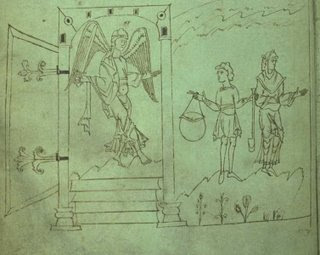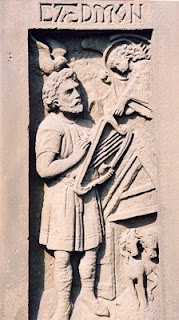St. Caedmon, 11 February

From the Medieval Saints Yahoo Group:
Happy St. Caedmon's Day, Feb 11
St. Caedmon, 1st named poet in English, monk
Died c. 680 at Whitby, Yorkshire North Riding
Not officially canonized, but he had a local cult in Northumbria, England
Commemorated February 11
St. Caedmon
http://www.britannia.com/bios/saints/caedmon.html
It was while St. Hilda ruled the monastery of Whitby as mother-Abbess, that there was employed, on the estate, a simple cowherd, named Caedmon. He was almost certainly of British origin, as his name is an Anglicisation of the Welsh, Cadfan. Though advanced in years, this man had learned nothing of verse: "Wherefore," says Bede, "being sometimes at feasts, when all agreed for glee's sake to sing in turn, he no sooner saw the harp come towards him than he rose up from the board and went homewards.
Once, when he had done this and gone from the feast to the stable, where he had that night charge of the cattle, he laid himself down torest at the proper time and there appeared to him in his sleep one who said, greeting him by name, "Caedmon, sing some song to me."
"I cannot sing," he answered, "and for that reason I left the feastand came hither, because I could not sing." He who talked with him answered, "However that may be, you shall sing to me."'
"What shall I sing?" rejoined Caedmon.
"Sing the beginning of created things," said the other. Having received this answer, the abbey's cowherd began to sing, to the praise of God the Creator, verses which he had never heard before, and afterwards awaking from his sleep, he remembered all that he had sung in his dream and added more to the same effect in verse worthy of the Deity.
In the morning, Caedmon came to the steward, his superior, and, having acquainted him with the gift which he had received, was conducted to the Abbess. Lady Hilda ordered him, in the presence of many learned men, to tell his dream and repeat the verses, that they might all give their judgment what it was and whence his verse proceeded. They all concluded that heavenly grace had been conferred upon him by Our Lord.
They explained to him a passage in Holy Writ, ordering him, if he could, to put the same into verse. Having undertaken it, he went away and, returning the next morning, gave it to them, composed in the most excellent verse. Whereupon the Abbess, understanding the Divine grace in the man, instructed him to quit the secular habit and take upon him the monastic life.
This being accordingly undertaken, Abbess Hilda associated Caedmon with the rest of the brethren in her monastery and ordered that he should be taught the whole series of sacred history. Thus he, keeping in mind all he heard, converted the narrative into most harmonious verse and sweetly repeating the same, made his masters in turn his hearers. He sang the Creation of the World, the Origin of Man and all the history of Genesis; the departure of the Children of Israel out of Egypt and their entering into the Land of Promise, with many other histories from Holy Writ; the Incarnation, Passion and Resurrection of Our Lord and his Ascension into Heaven; the coming of the Holy Ghost and the preaching of the Apostles; also the terror of a future judgment, the horror of the pains of hell and the delights of heaven; besides many more about the Divine benefits and judgments. By all of these, he endeavoured to turn away men from the love of vice and to excite in them the love of good actions. Thus, Caedmon passed his days, dedicating his gift to the glory of God. "He never," says Bede, "could compose any trivial or idle song, but, as he recognised that it was God who had opened his lips, therefore, till his dying day, did his mouth show forth his praise."
How long Caedmon lived after he had received his gift is not recorded; but as he was already advanced in years, it was probably not long. His last illness lasted only for a fortnight and was not deemed serious by those about him. So slight it seemed that he was able to walk and talk all the time. But, on the evening of 11th February AD 680, he begged to be carried into the infirmary of the monastery, to rest there that night. His request was granted and, far into the night, he sat talking with those around him. Suddenly, he asked for the Eucharist. "What need of the Eucharist?" said those around him, "you are not like to die, since you talk so joyfully with us, as if you were in perfect health."
"However," said he, "bring me the Eucharist." Having received the same into his hand, he asked whether they were all in charity with him, and without any ill will or rancour. They answered that they were all in perfect charity and free from all anger and, in their turn, asked him whether he was in the same mind towards them. He immediately answered, "I am in charity, my children, with all God's servants." Then, strengthening himself with the heavenly food, he prepared for the entrance into another life and asked how near the hour was when the brethren were to be wakened to sing the nocturnal praises of our Lord?
They answered, "It is not far off."
Then he said, "It is well. Let us wait that hour," and signing himself with the sign of the Cross, he laid his head on the pillow and, falling into a gentle slumber, ended his life in silence. And so it was, that as he had served God with a simple and pure mind, and tranquil devotion, so he departed to his presence, leaving the World by a tranquil death. The tongue, which had composed so many holy words in praise of the Creator, in like manner uttered its last words whilst he was in the act of signing himself with the Cross and recommending his spirit into the hands of God.
Unfortunately, none of Caedmon's poems have survived for certain, save the nine lines in Latin recorded by Bede and in the vernacular in an early version of the Ecclesiastical History. He was buried at Whitby Abbey and, in the years after its restoration when St. Hilda's body had been removed to Glastonbury, his shrine became an important centre of pilgrimage in the North.
Edited from ECS Gibson's "Northumbrian Saints" (1884).
---------------------
A manuscript image of Caedmon's Dream
Bede's Account of the Poet Caedmon (Bodleian Library, MS Tanner 10).
http://sayhwaet.angelcities.com/translation/caed.htm
He was, this man, settled in a worldly life until the time he was of old age, and he never learned any poetry. And therefore, often in beership, when there was deemed cause for bliss, that they should all sing in succession with the harp; when he saw the harp nearing him, he then arose from the feast out of shame and went home to his house. When he did that one time, such that he abandoned the house of the beership and was going out to the animals' shed, the keeping of which he was charged with that night, he then at a fitting time settled his limbs in rest and slept. Then some man stood over him in a dream and hailed and greeted him, and called him by his name: "Caedmon, sing me something." Then answered he and said, "I cannot sing; and because of that I went out of the beership and departed hither, because I could not sing." Then spoke he who was with him (he was speaking): "However, you could sing to me!" Then he said, "What shall I sing?" Said he, "Sing to me of the Creation." When he received this answer, he began at once to sing in praise of God the Shaper these verses, and those words of which he had never heard, of which the order was this:
Now we must exalt the Guardian of the Kingdom of Heaven,
the might of the Creator and the spirit of his thought,
the work of the Glory-Father as he founded the beginning
of every wonder, the eternal Lord.
He first created Heaven as a roof
for the sons of men, the Holy Shaper;
then the middle-yard the Ward of humanity,
the eternal Lord, afterwards created
the world for mankind, the Father Almighty.
---------------------
From the Catholic Encyclopedia:
http://www.newadvent.org/cathen/03131c.htm
Bede tells us that many English writers of sacred verse had imitated Caedmon, but that none had equalled him. The literary value of parts of the Caedmonian poems is undoubtedly of a high order. The Bible stories are not merely paraphrased, but have been brooded upon by the poet until developed into a vivid picture, with touches drawn from the English life and landscape about him. The story of the flight of Israel resounds with the tread of armies and the excitement of camp and battle. The "Genesis" and the "Christ and Satan" have the glow of dramatic life, and the character of Satan is sharply delineated. The poems, whether we say they are Caedmon's or of the school of Caedmon, mark a worthy beginning of the long and noble line of English sacred poetry.
---------------------
More on Caedmon
http://www.monksofadoration.org/caedmon.html
http://www.stthomasirondequoit.com/SaintsAlive/id624.htm

Additional Links:
This blog post is an excellent resource on Caedmon's Hymn.
Labels: England, Music, Poetry, Saints and Martyrs



0 Comments:
Post a Comment
<< Home